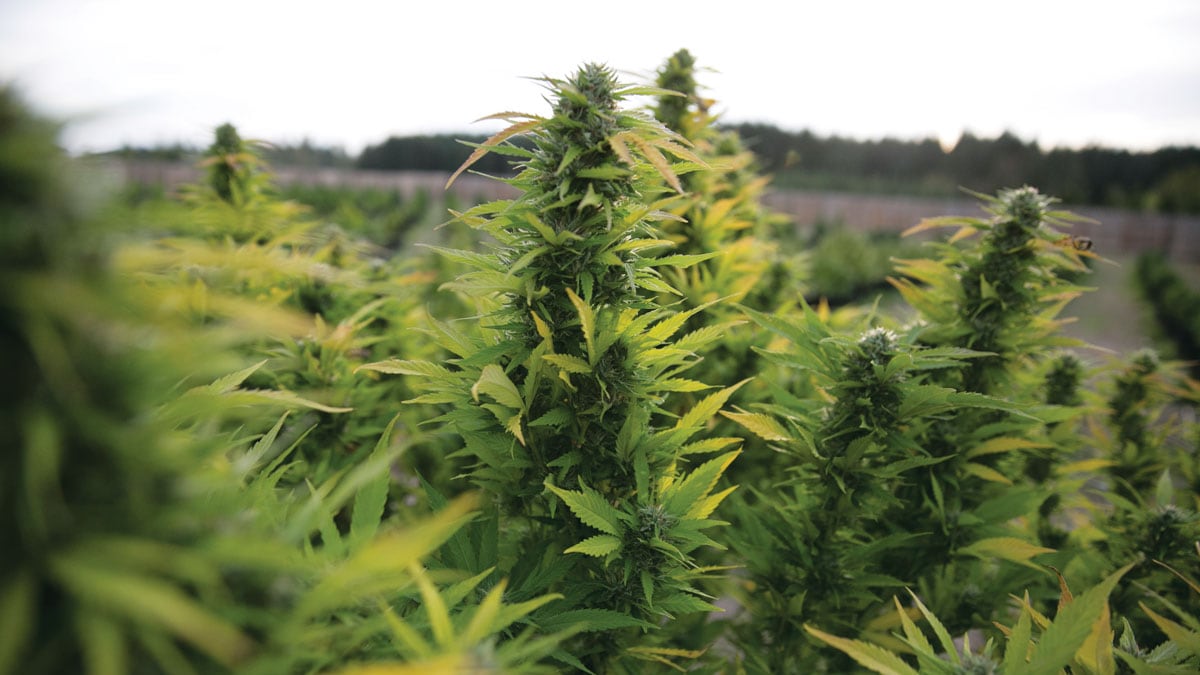Photo by Jake Southard.
Why would any Oregon cannabis grower go back to the black market?
Amid investors thrusting business cards into the hands of local entrepreneurs, and state agencies counting every gram in the medical and recreational industries, it seems crazy to return to the sketchy days of coffee table deals. Especially as we prepare for Trump's virulently anti-weed attorney general. But it appears to be happening, and much faster than many predicted.
People are obviously not enthusiastic to talk about this on the record. But that's what I've heard from sources such as Richard Walling, a representative of Eugene's Iron Labs, which tests cannabis. He says his company "hasn't heard from many medical customers that we worked with last year."
The ones it has heard from admit they can't afford to keep up their medical licenses anymore. Besides the tripling costs to get a crop tested for sale to a dispensary, the Oregon Health Authority has enforced new $200 "annual grow site fees," and medical growers are quickly facing stiffer competition as most shops obtain recreational licenses and start buying exclusively from recreationally licensed growers.
Related: Oregon Cannabis is Headed for a Tough Month Because of an Obscure Agency and Strict New Rules
Anyone who's grown longer than five years has connections that can move some product on the street—and off the books. While it means abandoning the mission of normalizing cannabis and returning to hiding from the cops in basements, it's easy to understand, given the state's massive take, why many well-intentioned medical growers may opt out of the legal market.
The situation also represents a huge challenge for the Oregon Health Authority—an organization which, above all, is supposed to safeguard the health of Oregonians. These new rules, combined with a brutal outdoor harvest season in Southern Oregon, represent a major threat to the integrity of this new industry.
We're used to talking about Portland's big, shiny new cannabis operations. But the bulk of the state's industry is still small-time growers in towns like Applegate and Grants Pass. There are more than 32,000 OHA-licensed medical grows and 338 recreational grows licensed by the Oregon Liquor Control Commission. A whopping 7,487 grows operate in the Southern Oregon counties of Douglas, Jackson and Josephine alone. With less than a dozen labs verified to perform the new analytic requirements, the labs should be swamped—if the growers were doing everything now required.
Ashley Preece-Sackett, co-founder of Bend's Cascadia Labs, says she still sees more medical growers than recreational growers drop samples off, but new faces are replacing familiar farmers.
"The people throwing in the towel at this point tend to be expert growers who don't have the new money or business savvy to make the necessary changes that it takes to become a robust brand," says Preece-Sackett. "It's hard for them to grasp these increases to overhead are an investment in becoming a fully formed business."
Because of a wet and cold end to the growing season in Southern Oregon, there's going to be a lot of cheap, moldy bud available, and a lot of desperate growers trying keep their farms alive. In October, just as they were beginning to cut down their plants, a storm hit with record rainfall. Rental shops were out of dehumidifiers, and white puffs of mold started showing up.
If you were in their shoes, what would you do?
Would you spend weeks going through every individual bud, ensuring no mold gets through and harms a consumer, possibly ruining your company's reputation? Or hedge your bets, save on the labor costs, and torch it?
Some opted to stay right with the law—by burning their crop in giant bonfires. Growers like Brent Kenyon of Jackson County told the Mail Tribune he burned 20 percent of his crop to get rid of moldy bud, and will have to carefully examine the rest before sending off samples to the lab.
Others didn't bother to spend the time and money to ensure their buds could be sold to a dispensary. There are more than 4,100 registered medical growers in Lane County, but one of the few testing facilities there has seen only a handful of medical samples dropped off.
To a small farm, where the sale of 1 pound might determine whether you can pay your electrical bill next month, going underground is more comfortable than the risk of failing as a legal operation. For many, being in the system is the scary and new part. Selling illegally is a return to the good ol' days.
